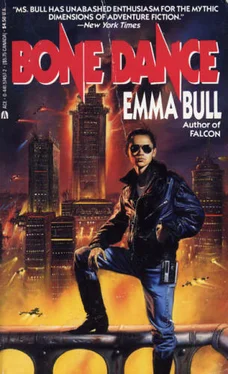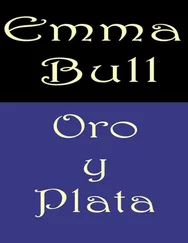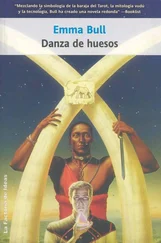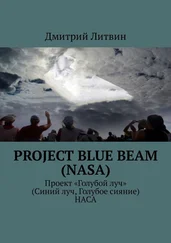The curtains were blowing lazily at the window; the breeze was lukewarm and smelled of the garden. A shaft of light gently cooked the floorboards. I didn’t remember falling asleep, but it must have happened. There was a distinct feeling of afternoon in the air.
I sat up and swung my bare feet to the floor, and thought, There’s more changed than the hour. It might have been the light. It might have been that the filter of weariness and alarm was thinner. Or maybe Frances was right: Maybe somehow we’d been drugged, and it had worn off. But the room seemed different.
Had the wallpaper been like that, before? Hadn’t the bedspread been a little threadbare? For that matter, had there been curtains? I couldn’t remember. The room seemed less determinedly reassuring and more… exotic? Not quite. Well, I’d been awfully tired.
I put my boots back on and cleaned up a little at the dresser. When I tried the door, I felt an instant of fright. Then I remembered I’d locked it. At least nobody had been hanging curtains while I slept.
In the hall, on the floor by the door, I found my canvas pack. So the porter had come up. I dropped it in a ladderback chair that I didn’t remember, either. The corridor was quiet. I thought about trying Frances’s or Mick’s doors; then realized I didn’t know why I’d want to.
When I came out of the bathroom, the enormous gray dog was waiting in the hall. It rose to its feet and gave that articulate single wag of its tail. Then it turned and went to the junction of the next corridor, and looked back.
“Don’t tell me,” I said aloud. “The old mine caved in, and I have to come rescue little Timmy.” The dog, mercifully, did not respond. I could test matters by trying to walk back to my room, but why bother? I followed the dog.
A left turn, and a left, and I was at the top of the stairs. It was as annoying as not arriving at the top of the stairs the last time I tried it. At the bottom of the stairs I was in the beautiful front hall. The dog trotted into the ivy parlor. I thought it seemed a little smug; given the success Frances and I had had at reaching the same place by the same route, I supposed it had a right. I heard voices and clinking in the parlor: low, even voices and the noise of crockery used as its manufacturer had intended. It seemed, if not safe to go in, at least the next logical step.
Everyone looked up when I entered, including the dog. Everyone was China Black and Mr. Lyle, Frances and Mick. They were sitting on a pair of cushioned wicker couches that faced each other, one team to a couch. I had just begun to wonder which team I was on when I looked past them.
The far wall of the parlor held a log-swallowing fireplace, surrounded by painted tiles and complicated woodwork, surmounted by a mantelpiece with what seemed a hundred unmatched candlesticks on it, and a huge, gold-framed mirror over that. On either side, taking up the rest of the wall from side to side and floor to ceiling, fronted in leaded glass, were bookshelves. Full bookshelves.
I made the circuit around the couches without exactly seeing them and stood in front of the right-hand case. What was probably the complete works of Mark Twain, in leather. The Jungle Book. The Encyclopedia of Folklore. Treasure Island . Shakespeare, Yeats, Piercy, Eliot, Woolf. Halliburton’s Book of Marvels. Grieve’s herbal. Stephen Jay Gould and Martin Gardner. And those were the ones I recognized. Who were Gene Wolfe and Alice Walker and Kenneth Roberts and Jane Austen? Maya Angelou and John Crowley and Zora Neale Hurston? And there was another bookcase on the other side.
“I knew you’d do that,” said Mick’s voice, and I jumped. I really had forgotten there were other people in the room.
“I’m sorry,” I said, and yanked my eyes from the books and back to the pair of couches. “Excuse me.”
China Black’s face was uninformative, but Mr. Lyle was smiling broadly. “That’s only part of the collection,” he said. “The rest is in the library. I’ll take you there when we’ve finished tea.”
Chango—the rest. “Do you have any”—I fished in my memory for the name—”Marquez?”
“All of his, I think,” said Mr. Lyle gravely. “One of my favorites. Now, sit down and have some tea.”
I saw a wicker chair with a cushion that matched the couches on one side of the fireplace. I carried it over and set it firmly down with its back to the bookcases. Which meant the seating was now U-shaped, with me halfway between the two couches.
Mr. Lyle hadn’t meant tea; he’d meant Tea. On the low table that separated the couches was a brass samovar, a plate of sandwiches, a bowl of dark muffins the size of dandelion puff-balls, a tray of cookies with specks of something in them, and a bowl of strawberries. There were also two cups. I looked to see who else hadn’t gotten tea yet, but Mick, Frances, China Black, and Mr. Lyle were all holding theirs. Maybe the dog had decided to wait.
The tea was mint, the sandwiches were cucumber and basil, the muffins were carrot, and the specks in the cookies were caraway. Then, I didn’t think that was significant. Tasty, but not significant. Now I wonder: How much of what I ate at that meal came from the garden that held that house like a cupped hand?
“You are safe here,” China Black said, “as long as you are our guests.” She was stern and distant, the patron of some church that put mercy after judgment. Her voice was roughened a little, as if from hard use. “It seemed to me we must have safety before we could speak freely. But now I would like to know why you are here.” And she looked at Frances and Mick.
Since her attention was elsewhere, I studied her over the edge of my cup. She wore a long, sleeveless olive-green dress, and a headwrap of green and yellow. Her nose, in profile, was high-bridged, and the nearest eyebrow shone like a streak of sweat. Her eyes were almond-shaped and sleepy-looking. I didn’t think she was sleepy.
“I’d like to know why you ask,” said Frances, smiling blandly.
Trust Frances to put all this amicability to flight. She watched us over her teacup like a panther eyeing a herd of antelope.
China Black was unruffled. “Would you like my credentials?”
“It’s a start,” Frances said.
Our hostess—was she our hostess?—seemed almost pleased. “This is a city divided in power. There is A. A. Albrecht, who sits at what he thinks is the heart, and tries to keep the flow of power all one way, all toward himself. He does not know, or care, perhaps, that the City is an organism, and that without its circulation, it will die. I am a houngan; I was chosen by the snake thirty years ago to serve the spirits, and the living. I and those like me try to keep the City’s lifeblood flowing in spite of Albrecht.”
“I thought if you were a woman, you were a mambo, not a houngan.”
“Once, if you were a woman, you could not be a houngan. And once, if you were a woman, you couldn’t be a soldier.” The look she gave Frances was probably meant to be quelling.
“Power is most things to most people,” said Frances. “When you talk about power in the City, do you mean money? Politics?”
“I mean energy,” China Black replied.
Frances’s expression made me think again of predators. “The ju-ju kind?” she asked with a hint of distaste.
“Not usually. Like you, he has little interest in the spirit.” China Black’s teeth flashed, just for a moment. “He wants to control electricity and fuel. If your vehicle was powered by methane, he would have it confiscated, because in the City no one may use fuel he does not profit from, and he neither makes nor taxes methane.”
Читать дальше












